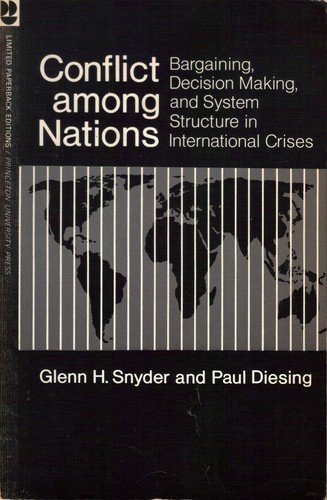Background
Diesing, Paul Robert was born in 1922 in Elgin, Illinois, United States.


( The purpose of this book is to examine how ideology op...)
The purpose of this book is to examine how ideology operates—in the sense of influencing the conduct of inquiry—in the policy sciences, defined as economics, political science, and sociology. In it, Diesing critically explores all the major schools of policy-related social thought from 1930 to 1975. Richard Hartwig, in his new introduction, notes, “In 1982, Diesing published a remarkable book entitled Science and Ideology in the Policy Sciences. It was the best book I had read in a decade, and it related directly to all the policy sciences…. I consider this to be the most brilliant of Diesing’s books. Like all of Diesing’s works, it remains highly relevant today.”
http://www.amazon.com/gp/product/0202308154/?tag=2022091-20

( How do nations act in a crisis? This book seeks to answ...)
How do nations act in a crisis? This book seeks to answer that question both theoretically and historically. It tests and synthesizes theories of political behavior by comparing them with the historical record. The authors apply theories of bargaining, game theory, information processing, decision-making, and international systems to case histories of sixteen crises that occurred during a seventy-five year period. The result is a revision and integration of diverse concepts and the development of a new empirical theory of international conflict. Originally published in 1978. The Princeton Legacy Library uses the latest print-on-demand technology to again make available previously out-of-print books from the distinguished backlist of Princeton University Press. These paperback editions preserve the original texts of these important books while presenting them in durable paperback editions. The goal of the Princeton Legacy Library is to vastly increase access to the rich scholarly heritage found in the thousands of books published by Princeton University Press since its founding in 1905.
http://www.amazon.com/gp/product/0691100578/?tag=2022091-20

( Social scientists are often vexed because their work do...)
Social scientists are often vexed because their work does not satisfy the criteria of "scientific" methodology developed by philosophers of science and logicians who use the natural sciences as their model. In this study, Paul Diesing defines science not by reference to these arbitrary norms delineated by those outside the field but in terms of norms implicit in what social scientists actually do in their everyday work. Patterns of Discovery in the Social Sciences is a detailed and systematic report on the full range of methods and procedures as they are actually practiced. Neither a how-to-do-it handbook nor a lofty philosophical treatise, this is a truly interdisciplinary study of the basic modes of procedure in scientific inquiry, with a special emphasis on normative politics. Diesing treats scientific methods as inductive logics of discovery in continuous evolution. He emphasizes the variety of methods available, discusses the advantages and disadvantages of specific methods, and, in particular, provides an account of mathematical modeling and of participant observation. The book will be of immense interest to all working social scientists, graduate students in any of the social science disciplines, and philosophers of science. It can also be employed as a text or supplement in courses in sociological methods and philosophy of science. This book is also a noteworthy companion to Diesing's major work on Science and Ideology in the Policy Sciences.
http://www.amazon.com/gp/product/020230101X/?tag=2022091-20
Diesing, Paul Robert was born in 1922 in Elgin, Illinois, United States.
Master of Arts, University Chicago, 1948. Doctor of Philosophy, University Chicago, 1952.
Lecturer University Chicago, 1950-1952. Assistant professor University Illinois, Urbana, 1952-1962. Visiting lecturer University Colorado, Boulder, 1962-1963.
Professor philosophy State University of New York, Buffalo, 1963—1974, professor political science, 1968—1992. Retired, 1992
Lecturer sociology, 1992-1993.
( Social scientists are often vexed because their work do...)
( The purpose of this book is to examine how ideology op...)
( How do nations act in a crisis? This book seeks to answ...)
President musicians' board Amherst Symphony, New York, 1980-1983. Pfc United States Army, 1943-1946. Member American Philosophical Association, Society Social Studies of Social Sciences, Union Radical Political Economists, Association Evolutionary Economics.
Son of Arthur E. and Eleanor M. (Doederlein) D. M. Eleanor Zuckman, September 29, 1948. Children: Richard, Molly, Sarah, Max.
